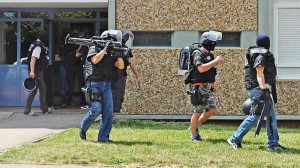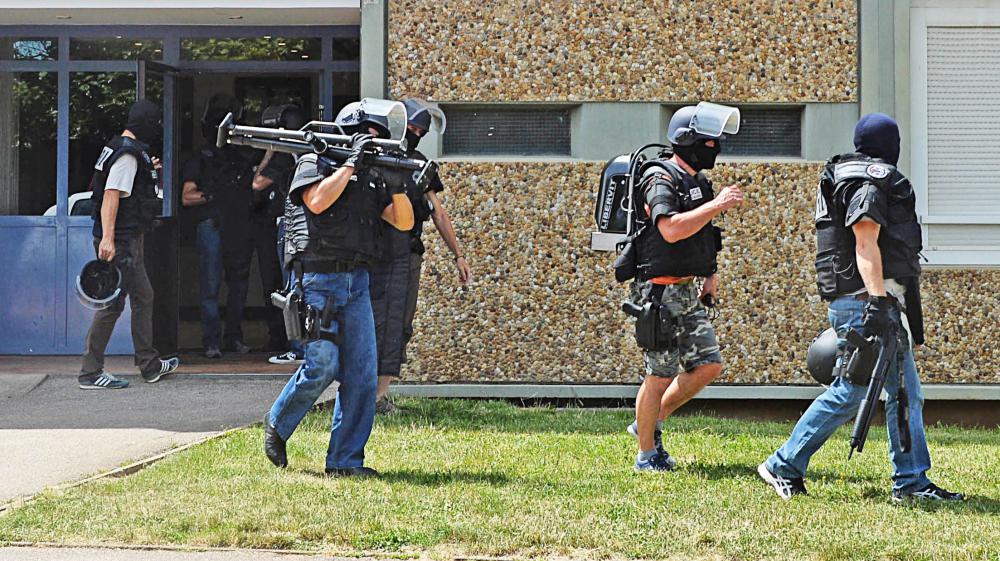A day after a man was decapitated at a gas factory in France’s second terror attack in six months, residents questioned whether the nation is doing enough to stop terrorists.
“It feels that these attacks are now happening back to back,” said Ilan Cohn, 21, a student in Paris. “I am afraid that there will be more and more, just recently Charlie Hebdo and now this?
Yaccine Salhi, 35, a man once placed on a “radicalization list” drove his truck into a U.S.-owned gas factory in the southeastern French city Lyon on Friday, triggering an explosion as his boss’ severed head was found at the entrance, authorities said.
Two people were injured in the explosion of gas canisters. “Islamist terrorism has again struck France,” Prime Minister Manuel Valls said. He warned Saturday that France faces even more attacks.
Officials told the Associated Press and AFP on Saturday that Salhi took a selfie with the slain victim and sent the image to at least one recipient.
French security forces had been on high alert since Islamic extremist gunmen targeted the Paris office of satirical magazine Charlie Hebdo in January, setting off several days of attacks in the city that left 20 people dead.
“These were the actions of a few isolated men but what if it’s not the case next time — we could have a mass attack by an organized network of fundamentalists,” Cohn said. “That’s really scary. It doesn’t feel like the authorities are able to prevent anything.”
Salhi — who remained in custody Saturday along with his wife and sister — was known to intelligence services but had not been actively monitored by security officers since 2008.

No group has yet claimed responsibility for the attack at U.S.-based Air Products’ factory in Saint-Quentin-Fallavier. It happened the same day as Islamic State-claimed attacks at a Shiite mosque in Kuwait and a beach resort in Tunisia. Overall, at least 66 people died across the three countries.
Several hundred people gathered in Saint-Quentin-Fallavier on Saturday to remember slain businessman Herve Cornara, 54, and denounce the violence, the Associated Press reported. Cornara was the manager of a transportation company in the region that had employed Salhi since March.
French Interior Minister Bernard Cazeneuve said Salhi is believed to have been under the influence of the extreme Salafist branch of Islam that calls for the faithful to return to the religion’s roots. Arabic inscriptions were found scrawled on the victim and Islamic flags were discovered at the plant.
“Now we are not safe at all. If everything was under strict surveillance, we wouldn’t have this in France,” said Madeline Siloe, 33, a health coach from the French capital. “It doesn’t seem to me that there is a serious surveillance, that anyone is watching.”
But analysts say France has doubled its efforts to counter terrorism since the attack onCharlie Hebdo in January, for which the Islamic State claimed responsibility.
Since then, thousands of extra police and military forces have been posted at “sensitive sites,” such as tourist attractions and transport hubs, around the country. The parliament passed a sweeping surveillance bill this week giving vast powers to intelligence services. Opponents of the controversial legislation say it grants powers with little oversight and is broader than the much-maligned U.S. Patriot Act.
“It would be inaccurate to say that the French government hasn’t done enough to counter the terrorist threat in recent months and years,” said Benoît Gomis, an international security and terrorism expert at think tank Chatham House.
“If anything some of what has been put in place might have gone too far in terms of creating opportunity costs, grievances, and infringing on privacy and other civil liberties,” Gomis said. “It will never be possible to stop every single terrorist attack.”
About 1,700 French citizens are believe to be involved in “jihadist networks” as of last month. France also has one of the highest numbers of foreign fighters in Syria and Iraq per capita in Europe, Gomis said.
Any measures to tackle the problem could be ineffective if France ignores the context in which people are attracted to radical causes, he added.
“More needs to be done to address some of the conducive factors to extremism of all sorts in France, especially on the social and political fronts,” Gomis said. “The government needs to ensure that this terrorist attack does not serve as a pretext to victimize the Muslim population, create tensions between communities or spread disproportionate levels of fear about terrorism.”
The number of terrorist attacks worldwide increased 35% last year. More than 78% of all terror-related fatalities took place in Iraq, Nigeria, Afghanistan, Pakistan and Syria, according to the U.S. Bureau of Counterterrorism. With France on high alert and bracing itself for what comes next, Paris resident Siloe says fear is not the answer.
“I am not afraid but I am worried, if said I am afraid it would mean they have won,” she said. “I think we have to be extremely vigilant and keep in mind what happened. We mustn’t forget about it tomorrow.”






